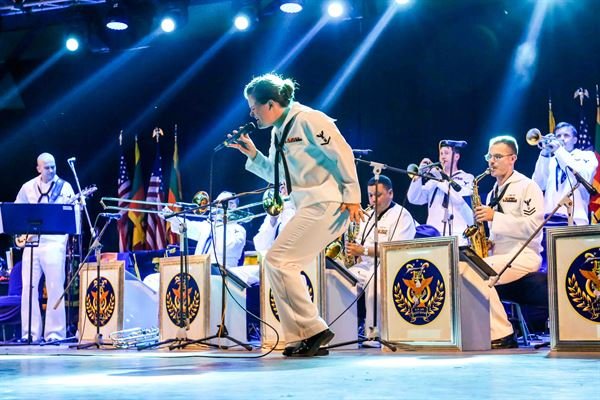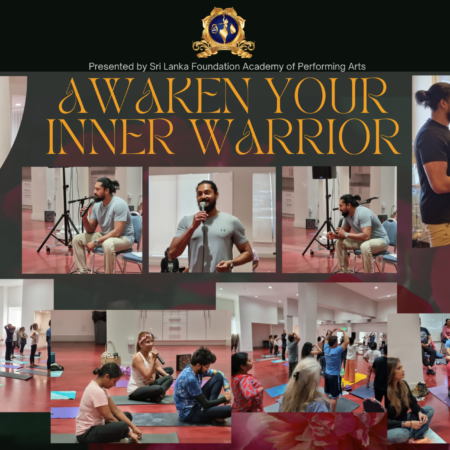I don’t tend to get nervous before a gig, but I was definitely sweating for this one.
In my first port visit to Sri Lanka, I was welcomed by a heat wave, but that’s not the reason I was sweating — more on that later. Bottom line: I knew this was one of our biggest engagements in the U.S. 7th Fleet’s Indo-Asia Pacific “spring patrol.”
We off-loaded our musical gear and headed to Viharamahadevi Park; the oldest and largest in Colombo, named after a young patriotic princess who sacrificed herself to the sea when it was believed that the sins of her father caused the ocean to rush inland and flood the land.
2005 was the last time the 7th Fleet Band performed in Sri Lanka; a time in which the country was in the midst of a civil war. So being back and performing with the Sri Lanka Armed Forces in a joint concert was special, in that after so much turmoil we could come together through music and show unity that may have not been so public before. Plus, I was inspired by Viharamahadevi’s patriotism and bravery — a quality I would need later in the evening.
It was our turn to play… We started off on a high note with In the Mood and classics from Stevie Wonder, including Big Band jazz standards. The audience responded really well to our performance.
However, I became nervous when it came time for me to perform a song — in Sinhalese.
My nervousness was magnified by the audience, which included very high-ranking Sri Lankan Navy, Army, and Air Force military officials and the U.S. ambassador to Sri Lanka. There was also a very heavy media presence.
I told the audience “learning a song in a foreign language” is one of the coolest things the 7th Fleet Band does when we travel to different ports in that it fosters partnerships by showing respect for the local culture. Before the first note, the Sri Lankan crowd responded with energy and excitement. It was encouraging.
I mean here I am, a petty officer 3rd class with barely two years in the Navy, singing on stage in Sri Lanka, in Sinhalese! I don’t know how many American musicians — Navy or otherwise — can say that.
I sang “Api Kawuruda,” by Senaka Batagoda. When I found out we were going to Sri Lanka, I went straight to YouTube to see if I could find a popular song. I ended up finding a TV show called “Dream Star” where I heard a girl singing a version of Api Kawuruda. I found other covers of Senaka’s, including his original version. I thought this song had great meaning and a beautiful melody.
My performance went very well; so well a video of it went viral in a matter hours.
The following day, the pop music component of our band, Far East Edition, played at a restaurant hotspot called the Dutch Hospital. The audience sang and danced along with the various American favorites we performed. Once again I performed the same song in Sinhalese for the crowd, and once again the crowd responded with energy and excitement.
At the end of the show, as several people came up to take photos with us, one of the locals came up and said, “You sang my song.” It took a moment for his words to register. Then I realized something… this man in front of me was Senaka Batagoda, the writer and artist of the local language tune Api Kawuruda. Surreal!
Senaka and his daughter both had tears in their eyes; they could not believe we had performed his song. They embraced me and the rest of the members of the band. Senaka told me the way we performed the song was “so beautiful,” and accurately portrayed the meaning of the song. He said he genuinely loved and felt the love we put in the music through our performance.
Meeting Batagoda and members of the Sri Lankan Armed Forces, and singing in Sinhalese, is an experience I will remember forever.
After Sri Lanka, we went to Mumbai, India.
The band and I continued to have many memorable engagements. Our Broadside Brass Band and Windfall Woodwind Trio had the opportunity to play at the Happy Home and School for the Blind.
To the surprise of the band members, the students at the Happy Home and School for the Blind put on a concert for us. Their choir and the tabla drum performance were unforgettable. It was a humbling and truly inspiring day.
Our last performance in India was with the Indian Navy band. It was yet another amazing first experience.
The original program for this concert didn’t include vocals. However, the Grammy award-winning song “Jai-Ho” from Slumdog Millionaire was added to the program. So I was called on to sing the song with the band, this time in Hindi. Luckily, I had saved the lyrics on my phone. It took several run-throughs during rehearsal to get a grasp of it and figure out the pronunciations. At some point an idea came about… for me to sing the song in a traditional Indian outfit called a sari.
The Indian Navy band executive officer’s wife helped me get dressed and ready for the concert. She not only allowed me to wear one of her saris, but also showed me how to wear it — moments before the concert.
It’s very rare a military musician performs out of uniform. However, this was a gesture of support and respect for their culture. For me, it was another lifetime moment.
What the 7th Fleet Band gets to experience in these foreign ports is really quite amazing. Being able to connect with people and their cultures through music as a military member is one of the greatest feelings.
Now I’m off to learn Cantonese and Mandarin to sing another local song at another first time port visit for me.
I am grateful that my band members are able to promote peace and stability through a universal language — music.
Source http://www.c7f.navy.mil/






















